Florida! Fun, sun... and bugs! All Florida residents will encounter pests. The question is what to do about them. Homeowners need to think about pest control as part of a home maintenance plan. While you can prevent pests from infesting your home, often the services of a professional are needed. Consider a professional pest control service for public health pests such as rodents, mosquitoes, bed bugs, cockroaches, and ants. Also, if you own your home, termite and wood-destroying organisms should be handled using a service provided by pest management professionals (PMPs). This publication is intended to provide guidance on securing general household pest (GHP) services.
Florida has the largest pest control market in the nation. So how do you choose the right pest control service for you? The key is to ask a lot of questions. Here are some tips:
-
1. Interview three to five pest control companies. Where to start? You can check on whether pest control companies are licensed in Florida and whether your pest professional is certified by using the FDACS Public Database Search https://aessearch.fdacs.gov/. Word-of-mouth, local referrals, internet research and online reviews, the Better Business Bureau (https://www.bbb.org/) can provide supporting information. A list of companies that have received training at Pest Management University, a UF/IFAS Extension program, is available here: https://pestmanagementuniversity.org/alumni/. This is not an endorsement or referral, simply a statement that the listed companies have completed UF/IFAS training.
Do an in-person interview. Many companies will offer free estimates. During the interview, the following observations should factor into your decision:
- The pest management professional should be dressed professionally in a business uniform.
- They should be ready to present a state identification card upon request. See Figure 1.
- The pest management professional should be able to provide a business telephone number and business address.
- Look at the vehicle. It should be clean and well-maintained. For example, equipment should be organized and pesticides clearly labeled and secure.
- By law, the vehicle driven by the person who will perform the pest control work must not use magnetic signage. Only sales vehicles can use magnetic signage.
- Ask the person inspecting your home for the name of their "certified operator in-charge." If they cannot name this key person, it should be a concern. See FAQs on the importance of the "certified operator in-charge."
- Recommendations and contract quotes should be completed based on the inspection of your home. Be wary of companies that provide quotes based on the size of your house only.
- The inspector may look under, around, behind, and on top of areas where pests may hide (Figure 2).
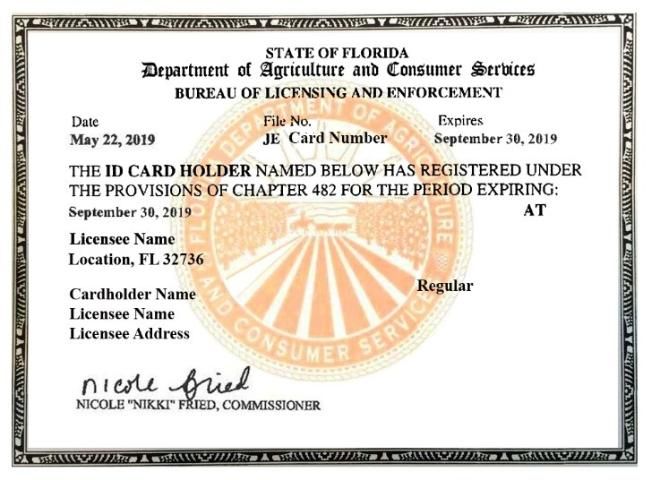
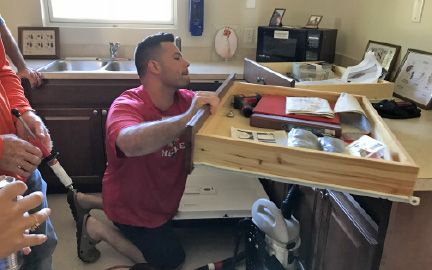
Credit: F. Oi, UF/IFAS
During the interview, pest management professionals urge you to ask potential providers the following questions:
- What is the length of the agreement/contract, the frequency of service, and the response time?
- What guarantees, if any, are offered?
- What will void your contract?
- How are your records kept and will they be readily accessible?
- How will scheduling work? Will the technician or office text/call you to narrow the window of arrival or if they will be late? Do I have to be home?
- What is the company training policy to ensure that technicians are up-to-date? See the FAQ section for technician training requirements. (Training should be continual. Some companies provide weekly training.)
- Is the company a member of a professional association such as the National Pest Management Association, Florida Pest Management Association, Certified Pest Control Operators, or a similar professional organization?
- See additional questions under point 3.
2. Determine that the companies are working legally in Florida. Illegal pest control operators are increasingly common throughout Florida and other states, posing a threat to people and the environment. Part of being a licensed pest management professional means that each pest control business location must carry insurance, have a full-time Florida-certified operator in charge of pest control operations at the business location, and meet statutory training and record-keeping requirements.
To help you determine whether companies are working legally, the Florida Department of Agriculture and Consumer Services (FDACS) has a publicly searchable website of licensed pest control companies in Florida. To perform a search:
- Click on the link: https://aessearch.fdacs.gov/
- Carefully enter the name of the pest control company and then click the search button.
- Search results should include the company of interest. The company may have more than one location (Figure 3).
- When you click on the company name, you should see a screen indicating the expiration date and status of the company license (Figure 4).
- If the "Status" reads "Normal," the company is legal, which means that FDACS has reviewed the insurance certificates, a list of each employee and their ID card number, and ID card status for each of the company's technicians.
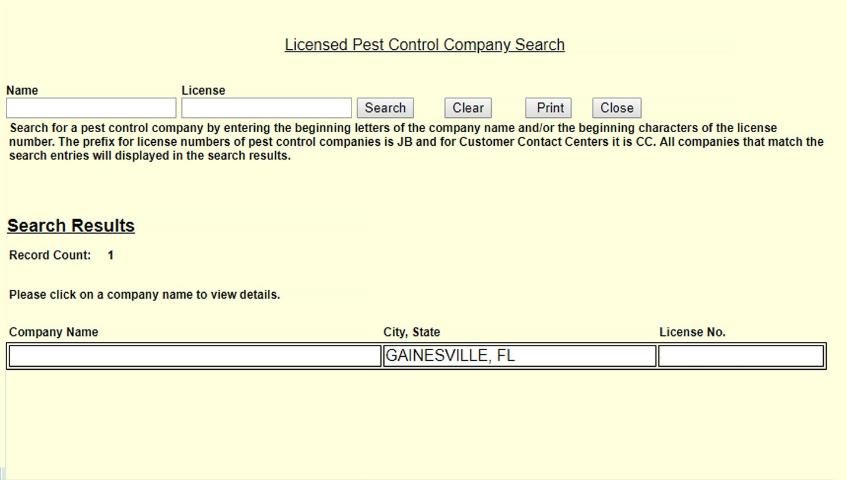
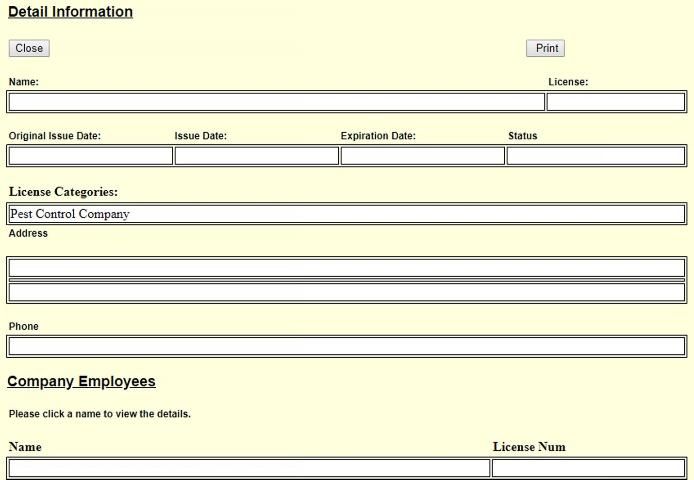
3. Additional items to consider. Pest management professionals shared that their customers value effective and efficient service done by knowledgeable technicians who communicate what they are doing and why. Based, in part, on customer feedback, this section outlines considerations for pricing, what to look for in a pest control plan, and what to expect after you have selected the company.
Pricing: Keep in mind that cheapest is not equal to best. The price that a company quotes will vary based on the type of service offered (i.e., monthly, quarterly, yearly) and whether the pest infestation is active or in the monitoring (prevention) phase. If pests are active, the level of pest activity should be considered.
- Pricing should be upfront, transparent, and in writing.
- Know when added fees apply.
- Do not feel pressured to sign up for special deals.
What to look for in developing a pest control plan:
- Strive to develop a partnership based on good communication. Approach pest management as a long-term commitment.
- A good pest management professional will listen to your concerns and consider them, so be ready to set those expectations.
- Understand that pest management professionals are constrained by the law in terms of pesticide applications. For example, they will not be able to accommodate a request to "spray everything."
- Companies should send a representative to inspect the property and home. The inspector may look "under, around, behind, and on top" of areas where pests may hide.
- Some companies will send a salesperson to do an initial assessment, discuss a contract and answer initial questions. If you select that company, there may be a different person, the technician, who performs the actual pest service.
- If you do not know how to recognize an insect infestation or damage, ask the salesperson/inspector to show it to you.
- Ask if the company uses an integrated pest management (IPM) approach. Integrated pest management is a dynamic process based on communication and education. It fits perfectly with home maintenance and develops a comprehensive game plan to protect your house. It is designed to:
- Stop pests
- Inspect and monitor for pests
- Identify pests
- Treat for pests only as needed.
- An IPM plan should include pest monitoring and pest prevention. Monitoring for pests is crucial for proper management. The pest control technician should place monitoring devices that will be their eyes and ears 24/7 for pests (Figure 5).
- A good IPM plan includes regular evaluation to determine whether the plan is working.
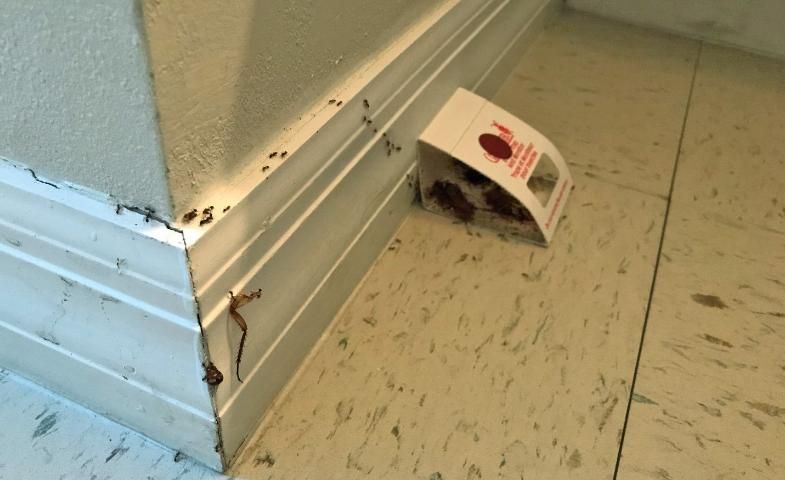
Other questions to ask:
- Ask what else you need to do to prepare your home for the service. Will you, your family, and pets need to vacate the premises during the pest control service? If so, for how long do you need to stay away? Do you need to move furniture or turn off irrigation?
- Pesticides should only be applied after a thorough inspection of the property and level of pest infestation is determined.
- Ask how pesticides will be applied.
- Risk is related to exposure. Broadcast applications pose the highest level of risk, while targeted approaches, such as crack and crevice treatments, or baits carry the lowest risk.
- Ask: Is it necessary to clean up pesticide residue? Required cleaning of pesticide residues should be rare when using an integrated pest management approach.
Pest management professionals should communicate a plan that will help you take care of an existing problem, as well as prevent future pest problems.
Once you have chosen a company:
- Make sure that you have a written quote that includes the services provided.
- Be sure you have read and understood the entire contract including all terms and conditions before you sign it. If anything is unclear, have the salesperson explain what is unclear
- Offer feedback on the service. Most companies want to know how they are doing.
- Pest management professionals should work with you to figure out how the pests became a problem in and around your home.
- Pest management professionals should be able to make recommendations on how to prevent pests in the future.
- It may cost more to come to your home more frequently to treat the infestation rather than to monitor for pests before they become a problem.
Home maintenance practices that are critical to IPM success
You may be asked to do or follow-up on these types of home maintenance tasks:
- Seal gaps around doors and windows where pests may enter.
- Tip: If you can see light through a crack or gap from the outside, while you are standing inside, it is enough space to allow in large cockroaches, other insects, spiders, and even rodents and snakes that are common in Florida. Sealing gaps also presents air loss, thus saving money on utility costs.
- Make sure irrigation is not directed at the walls of the home. Water (moisture) is considered a conducive condition that will encourage pest infestations and can also result in poor air quality inside.
- Remove tree and/or shrub branches that are touching the exterior walls or roof of a home because pests, including rodents and ants, commonly use them to find a way into the home (Figure 6).
- Eliminate debris in the yard where pests may harbor (live) and breed.
- Eliminate or regularly emptying water-holding containers that provide mosquito breeding sites.
- Inspect the inside of your home and eliminating places where pests can hide and breed inside your home.
- Remove cardboard boxes and sealing books and other paper items in plastic sealed containers.
- Keep food in sealed containers, including pet food.
- Regularly clean surfaces and appliances such as microwaves, stoves, and toaster ovens.
Once a pest has been controlled, it does not mean the work of pest control has ended. Pest control should be thought of as a part of routine home maintenance, particularly in states like Florida experience heavy pest pressure. Regularly employing a preventative approach to pest control using monitoring can save money and prevent damage to your home and the goods stored within.
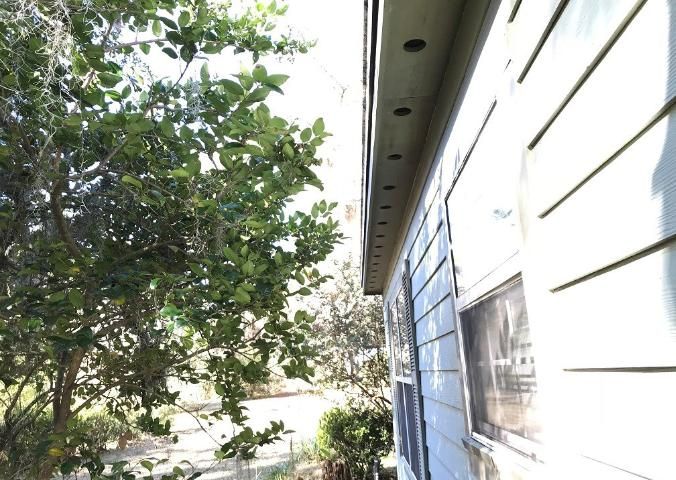
Credit: F. Oi, UF/IFAS
Frequently Asked Questions (FAQs)
- What are the different types of pest control categories?
Pest control falls into different licensing categories:
- General household pest control (GHP) for pests such as ants, cockroaches, fleas, rodents, and other pests generally related to the indoors.
- Termites and wood-destroying organisms (WDO) such as beetles and wood-decay fungi.
- Lawn and ornamentals (L&O).
- Fumigation.
Companies are required to have a certified operator in each of these categories if they are offering these services.
- What is the "certified operator?"
- The certified operator is a person who has met the state requirements to practice pest control. Certified operators must pass a state examination in a specific category of pest control.
- A certified operator is required to supervise the technician(s), who are usually the people servicing your home.
- The state definition is an "individual holding a current pest control operator's certificate issued by the department." (FS 482.021[4]).
- Who is the "certified operator in-charge?" The certified operator in-charge is responsible for the day-to-day operations at the location of the pest control business. This person is responsible for selecting the techniques and products used in servicing your home.
- A pest management professional should be aware of who the certified operator in-charge is. If they do not know who their certified operator in-charge is, it may mean that there is little supervision or guidance to the technician who is servicing your home, and you should be concerned.
- According to Florida Statute 482.021(5), "certified operator in-charge" means a person with these roles:
(a) Whose primary occupation is the pest control business;
(b) Who is employed full time by a licensee; and
(c) Whose principal duty is the personal supervision of the licensee's operation in a category or categories of pest control in which the operator is certified.
- Who is servicing my home?
- Usually a technician, also known as an "ID cardholder," working under the supervision of a certified operator will service your home.
- What are the requirements to become a technician?
- After being hired by a pest control company, the certified operator in-charge has up to 30 days to apply for an identification card for the new technician with FDACS.
- Within six months of hire, the technician is required to have at least 40 hours of documented training.
- Of these 40 hours, at least four hours of classroom training must be in pesticide safety, integrated pest management, and applicable federal and state laws and rules.
- The other hours are in undefined subjects within the categories of general household pests, termites and wood-destroying organisms (WDO), and lawn and ornamental pest management.
- After the initial training, the technician is required to have two hours of training annually. Records must be maintained by the company and available to FDACS for review upon request.
- Fumigation requires special certifications, as does some termite and WDO work, including filling out the WDO inspection form 13645 for the purposes of a real estate transaction, annual termite renewal inspections, and termite retreatments.
- Background checks are the responsibility of the hiring company, not FDACS.
- A full description of requirements can be found in Florida Statute 482.091.
Acknowledgements
This work is supported by the USDA National Institute of Food and Agriculture (NIFA), Hatch project FLA-ENY-005787 and USDA NIFA Crop Protection and Pest Management Grant 2018-70006-28919 . We also thank the pest management professionals who generously shared their expertise: Josh Alpert, Stuart Aust, Paul Bello, Ed Bordes, William Chandler, Mathew Esker, Damien Gokhool, Bryce Hamilton, Tony Long, Jeffrey McGovern, John Michael, Trent Mobley, Roland Reschreiter, Scott Smith, James Sneed, and Louis Witherington.